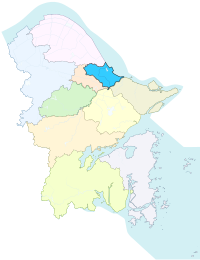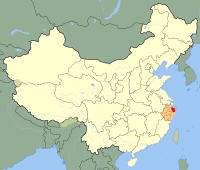Zhenhai
|
Zhenhai 镇海区 |
|
|---|---|
| District | |

Clockwise from the top: Zhaobao Hill, Zhenhai Harbor Area, Anyuan Fort, Ningbobang Museum, Zhenhai Skyline
|
|
 Zhenhai District in Ningbo Municipality |
|
 Ningbo Municipality in China |
|
| Country | China |
| Province | Zhejiang |
| Prefecture | Ningbo |
| Time zone | China Standard (UTC+8) |
| Website | www.zh.gov.cn |
| Zhenhai | |||||||||||||
| Traditional Chinese | |||||||||||||
|---|---|---|---|---|---|---|---|---|---|---|---|---|---|
| Simplified Chinese | |||||||||||||
| Literal meaning | Suppressing the Sea | ||||||||||||
|
|||||||||||||
| Transcriptions | |
|---|---|
| Standard Mandarin | |
| Hanyu Pinyin | Zhènhǎi |
| Wade–Giles | Chen-hai |
| Wu | |
| Romanization | Tzen-he |
Zhenhai District is an urban district of the prefecture-level city of Ningbo in Zhejiang Province in eastern China. It has a population of 200,000.
The town of Zhenhai grew up at the foot of Zhaobao Hill on a tongue of land at the mouth of the Yong River about 12 miles (19 km) north-east of central Ningbo.
Under the Qing, the city walls covered a circuit of 3 miles (5 km) and rose to 20 feet (6 m). The British captured Zhenhai on 10 October 1841 during the First Opium War, dismantling its former citadel. The Zhenhai Coastal Battery was the site of the 1885 Battle of Zhenhai during the Sino-French War.
In the later 19th century, Zhenhai was protected from the sea by a dike about 3 miles (4.8 km) long, made of large blocks of hewn granite.
Zhenhai has suffered severe long-term air pollution mainly emanating from the Ningbo Petro-Chemical Economic and Technical Development Zone built on its eastern coast. The zone is home to nearly 200 chemical plants including Zhenhai Refining and Chemical Corporation (ZRCC),a subsidiary of Sinopec and the largest oil refinery in China, LG-Yongxing, the largest ABS plastic producer in China and Zhenhai Port Liquid Chemical Dock, the largest liquid chemical dock in China. In September, 2007, 400 tones of acrylonitrile leaked from the LG-Yongxing plant and polluted air and underground water around adjacent areas. In late April, 2012, three million bees died in an orchard in Xiepu Town next to the Petro-Chemical Zone because of pollutants discharged by a chemical plant. Research has shown that the ratio of deaths from cancer in Zhenhai rose significantly between 2007 and 2009.
...
Wikipedia
